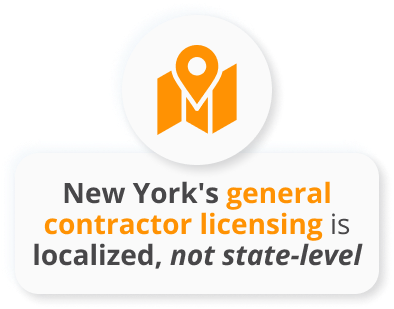Mastering the Local Landscape: Navigating General Contractor License in NY.
Unlock the secrets to thriving as a general contractor in New York with our comprehensive guide. Dive into the unique local licensing landscape, understand the critical insurance requirements, and arm yourself with the knowledge to navigate permits, registrations, and more. Whether you’re a seasoned pro or just starting out, this article is your key to success in the Empire State’s bustling construction industry.
Introduction to General Contractor License in NY.
Starting a career as a general contractor in the thriving state of New York presents a unique landscape that is distinctively different from many other regions in the United States. In this state, the approach to contractor licensing takes a localized turn, which diverges from the more common state-level requirements seen elsewhere. Learn how to Get your General Contractor License in NY.
A Unique Licensing Landscape
In New York, the responsibility of licensing general contractors falls not to the state but to individual cities and municipalities. This decentralized approach means that requirements, regulations, and processes can vary significantly from one locality to another, providing a tailored framework that aligns with each community’s specific needs and standards. Learn how to Get your General Contractor License in NY.
No State-Level Licensing for General Contractors
It’s crucial for contractors and those aspiring to enter the field to understand that New York does not mandate a state-level license for general contractors. This starkly contrasts many other states, where a single state-issued license would suffice to operate across various regions. In New York, the onus is on the contractor to navigate the local licensing landscape, ensuring compliance with the specific requirements of each municipality where they intend to work.
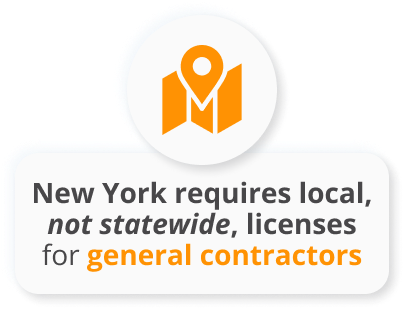
The Localized Approach to Licensing
New York’s decision to implement a local-level licensing system for general contractors is rooted in its unique urban landscape and the diverse needs of its numerous municipalities. This section delves into the rationale behind this approach, exploring both the advantages and challenges it presents to contractors operating within the state.
Why Local-Level Licensing?
The state of New York is characterized by its vast and varied terrain, encompassing bustling metropolitan areas, suburban communities, and rural regions. Each of these areas has its own specific needs, building codes, and regulations, necessitating a licensing system that can be tailored to suit these diverse conditions. Local-level licensing allows municipalities to establish standards and requirements that reflect their unique characteristics, ensuring that contractors are well-versed in the specific demands of the areas in which they work.
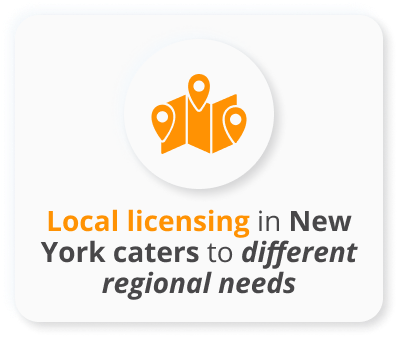
Benefits of the Localized Approach:
- Community-Specific Standards: Contractors are held to standards and regulations that are directly relevant to the communities they serve, ensuring a higher level of accountability and quality in construction work.
- Adaptability: The system is more adaptable to change, allowing municipalities to quickly update requirements and standards in response to evolving needs and circumstances.
- Enhanced Oversight: Local authorities are better positioned to oversee and enforce licensing regulations, ensuring that contractors comply with all relevant laws and standards.
Challenges and Considerations:
- Complexity: The localized approach introduces a level of complexity, as contractors must navigate different licensing requirements across various municipalities.
- Potential for Confusion: The lack of a standardized, state-wide system can lead to confusion, particularly for contractors who work across multiple jurisdictions.
- Administrative Burden: Managing licenses and permits across different localities can result in an increased administrative burden for contractors.
New York’s localized approach to contractor licensing reflects the state’s commitment to upholding the highest standards of construction and safety, tailored to the unique needs of its diverse communities. While it presents certain challenges, it also offers contractors the opportunity to truly excel in their specific locales, fostering a sense of accountability and excellence in the industry.
Comprehending Local Municipality Requirements
Embarking on construction projects in New York necessitates a comprehensive grasp of local municipality requirements. With the state’s localized approach to contractor licensing, mastering these varied regulations becomes an essential facet of your business operations.
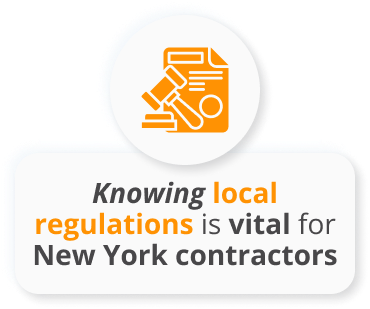
Identifying Local Licensing Authorities:
- Research Your Specific Locale: Begin by pinpointing the local municipality or city government responsible for contractor licensing in the area where you intend to work. This could be a city hall, county office, or a specific department dedicated to building and construction.
- Visit Official Websites: Most municipalities will maintain official websites with dedicated sections for contractor licensing, offering detailed information on requirements, application processes, and contact details.
- Make Direct Contact: Don’t hesitate to reach out directly to the local licensing authority. A phone call or in-person visit can provide clarity on specific requirements and help ensure that you have the most up-to-date information.
Understanding Local Regulations:
- Familiarize Yourself with Local Codes: Each municipality may have its own building codes, safety regulations, and licensing requirements. Invest time in familiarizing yourself with these local standards to ensure your work adheres to all regulations.
To find information about local codes, safety regulations, and licensing requirements for contractors in the state of New York, you can visit the following resources:
- New York State Department of State: The New York State Department of State (DOS) is responsible for licensing and regulating contractors in the state. On their website, you can find information on the different types of contractor licenses, the requirements for obtaining and maintaining a license, and the laws and regulations that apply to contractors.
- New York City Department of Buildings(DOB): The New York City Department of Buildings (DOB) is responsible for enforcing the city’s building codes and regulations. On their website, you can find information on the different types of construction permits required for different types of projects, the process for obtaining a permit, and the city’s building codes and regulations.
- National Association of Home Builders (NAHB) New York State Chapter: The NAHB New York State Chapter is a trade association that represents home builders and contractors in the state. On their website, you can find information on local building codes and regulations, as well as other resources for contractors.
- International Code Council (ICC): The ICC is a non-profit organization that publishes the International Building Code (IBC) and other widely used building codes. On their website, you can find information on the IBC and other building codes, as well as other resources for contractors.
Stay Updated: Regulations can change, and staying informed is key to maintaining adherence. Establish a routine for checking in with local authorities or subscribing to official newsletters to receive updates on any changes in licensing requirements.
The Importance of Compliance:
- Avoiding Penalties: Failure to adhere to local licensing requirements can result in fines, work stoppages, and damage to your professional reputation. Ensuring compliance helps avoid these costly setbacks.
- Building Trust: Demonstrating a commitment to compliance and adherence to local standards builds trust with clients, local authorities, and the community at large.
- Facilitating Project Progress: Having the necessary licenses in place ensures that your projects can proceed without interruption, maintaining project timelines and client satisfaction.
Insurance Requirements for General Contractor License in NY.
In the competitive and fast-paced construction industry of New York, safeguarding your business with adequate insurance coverage is not just a wise decision—it’s an absolute necessity. General contractors are expected to navigate a complex landscape of potential risks, and having the right insurance in place is crucial to protect against liabilities and ensure the longevity of your business.
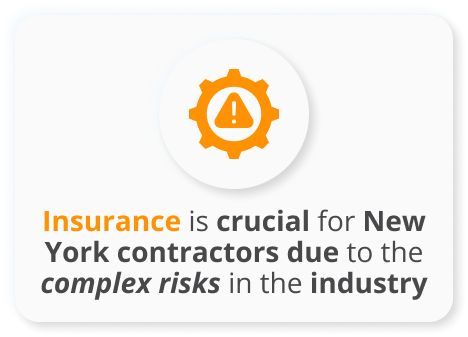
Typical Insurance Requirements:
- General Liability Insurance: This is a fundamental coverage that protects against claims of property damage, bodily injury, and personal injury that can occur during the course of your work. It’s essential for safeguarding your assets and maintaining a reputable standing in the industry.
- Workers’ Compensation Insurance: If you employ a team, workers’ compensation insurance is mandatory in New York. This coverage provides benefits to employees who suffer work-related injuries or illnesses, covering medical expenses and lost wages.
- Auto Insurance: For contractors who operate vehicles as part of their business, commercial auto insurance is necessary to cover potential damages or injuries resulting from vehicular accidents.
- Contractor’s Equipment Insurance: This covers the cost of repairing or replacing tools and equipment in the event of theft, vandalism, or damage.
Frequently Asked Questions (FAQ)
These are common questions about General Contractor License in New York.
This is a requirement to complete a simple application. Log in for a license. Give sales tax identification number. Please show us your residence. Show your corporate address Please. Ensure you’ve got workers compensation. Show proofs from companies requesting EPA certification.
To comply with general contractors license requirements you must: Have a minimum age of 17 years. Pass the background check at $33.50. Create a typewritten, signature and notariated General Contractor Registration form (LIC 7).
Contractors registration fees. $30.00. The renewal cost is $245. Late renewal fees: $50.90. Registration period of 3 years.


